- Home
- P. T. Deutermann
The Edge of Honor
The Edge of Honor Read online
THE EDGE OF HONOR by P. T. DEUTERMANN
THUNDEROUS APPLAUSE FOR P. T. DEUTERMANN AND THE EDGE OF HONOR:
St. Martin’s Paperbacks Titles by P. T. Deutermann
scorpion in the sea THE EDGE OF HONOR
ST. MARTIN’S PAPERBACKS
NOTE: If you purchased this book without a cover you should be aware that this book is stolen property. It was reported as “unsold and destroyed” to the publisher, and neither the author nor the publisher has received any payment for this “stripped book.”
This is a work of fiction. Characters, military organizations, ships, and places in this novel are either the product of the author’s imagination, or, if real, or based on real entities, are used fictitiously without any intent to describe their actual conduct or character. Insofar as this book addresses military issues, policies, and history, the work represents the views of the author alone and does not necessarily represent the policies and views of the United States Department of Defense.
THE EDGE OF HONOR
Copyright S 1994 by P. T. Deutermann.
Official Privilege excerpt copyright S 1995 by P. T. Deutermann.
All rights reserved. No part of this book may be used or reproduced in any manner whatsoever without written permission except in the case of brief quotations embodied in critical articles or reviews. For information address St. Martin’s Press, 175 Fifth Avenue, New York, N. Y.
10010.
Library of Congress Catalog Card Number: 94-2670
ISBN: 0-312-95396-8
Printed in the United States of America
St. Martin’s Press hardcover edition published 1994 St. Martin’s Paperbacks edition/May 1995
10 987654321
This book is dedicated to the thousands of men and women of the United States Navy who served honorably during the Vietnam War.
Acknowledgments
I wish to thank George Witte, Carol Edwards, and Sally Richardson at St. Martin’s Press for their extensive help with this book, and also my wife, Susan, for her sustaining confidence in this story.
THE EDGE OF HONOR
San Diego, California, September 1969
Brian Holcomb stood naked at the darkened bedroom window, staring out at the park across the street. The pale bark of the gray eucalyptus trees was daubed in orange from the glow of the new sodium-vapor lights along Balboa Park Drive. At least something around here had a glow on; he sure as hell did not. Maddy, his wife, spoke to him from the bed.
“Brian, it’s all right. Brian, come back to bed.”
“It’s not all right. Nothing’s all right. It’s deployment day, and I’m going away for seven months, and you’re miserable, and I can’t even—”
“Brian, please. It’s our last time to be together. Please, let’s not fight. I’m sorry I’m being such a bitch about the deployment. But come back to bed.” Brian sighed and turned around. The sight of Maddy in the soft light of the bedroom, that mass of blond hair, her lovely face, her glorious breasts bared above the sheet, was still enough to take his breath away, even after almost four years of marriage. So then why the hell on this, their last night, morning, whatever, together, couldn’t he perform?
As if reading his thought, Maddy patted the bed next to her.
“Come on, Brian. I hate it when you’re right there but not right here beside me. We should have just cuddled, like we agreed. We both know this is a lousy time for sex. Please?”
He walked back over to his side of the bed. She was right—as usual. He sat down on the edge of the bed and she slid across, folding her arms around him, her hair enveloping the side of his face. Her skin was warm against his back.
“Hey?” she whispered. “We’ll get through this; everyone else seems to manage. This isn’t the first ship that has to go to WESTPAC. I’ve got my job, and the rest of the wives—”
“Whom you don’t like very much.”
“I do like them. It’s more a question of not having very much in common with them, Brian. I work, most of them don’t, and we have no—”
“Yeah.”
He felt her stiffen slightly, and the blade of anger from the night before slipped between them again. They had gone out to dinner at Mr.
A’s, an expensive restaurant overlooking the San Diego skyline, whose tall windows gave a cockpit-level view of the jetliners as they swooped down into Lindbergh Field below. Brian had thought of going out to dinner as an activity, something to do that would eat up three or four hours of the “last night.”
As Maddy had fretted more and more about the ship’s departure, everything they did had acquired the adjective last: the last supper, the last night, the last morning—the last everything, because it was now deployment day.
He had made the mistake of mentioning children again, and the last evening had gone right off the last tracks.
And now, in just a few short hours, he would get up, shower, button and zip into his whites, and as It. Brian Holcomb, USN, Weapons officer in USS John Bell Hood, go down to the ship at the Thirty-second Street Naval Station and sail away to the Vietnam War for the next seven months.
And Maddy, his beautiful young wife of three-point something years, was not taking it too well. The ship’s schedule had not helped. The thirty days prior to deployment were called PORN: Preparation for Overseas Movement.
Perversely, as far as families were concerned, the closer a ship got to deployment day, the more time it demanded of its officers. The PORN preparations were seemingly endless as the avalanche of supplies, repair parts, new people, the latest tactical manuals, and a flurry of final grooming and repairs on the ship’s weapons and operations systems all conspired to produce twelve hour workdays at precisely the time that the wives tended to become clinging vines, desperately anxious for every moment of contact. Brian’s nights at home during the last thirty days had been punctuated by dramatic mood swings on Maddy’s part, from loving wife who poured on the affection to shrill harridan who railed against the deployment, the Vietnam War, and his Navy career in general.
The hell of it was that he was excited to be going.
He was beginning a prime assignment aboard a modern guided-missile ship, and they were bound for the Red Crown station up in the Gulf of Tonkin, to the heart of the carrier-air-war action on the one ship that controlled the skies over the Gulf, Damn it, he shouldn’t have to feel guilty about that. And more than that, this assignment was a make-or-break tour of duty: His promotion to lieutenant commander depended on his doing very well in this ship. Maddy was not helping. As a matter of fact, Maddy was on the verge of doing some damage. On the other hand, he fully recognized that she was acting this way only because he was going away.
He turned to her then, putting his arms around her, breathing in her sweet, familiar fragrance, his face pressed against her throat as she hugged him. He knew that all the noise was not aimed at him, but at what was coming for herthe empty apartment, the empty bed, long-delayed letters in place of a touch in the night. He would be in the thick of fleet operations in the Gulf of Tonkin and she would face the same empty routine day after day. His heart ached, not for the first time, at the thought of being away from her for seven long months.
At moments like this, even he was willing to think of the Navy as the god damned Navy, lately her favorite expression. And then there was that enormously sensitive nerve about children upon which he had just touched. He wanted kids; she did, too, but she had set what he felt was an impossible condition: “We’ll have a family only when you’re going to be home to help.” A successful career in the seagoing Navy did not necessarily lend itself to that proposition. They had both finally realized that the whole subject of starting a family was becoming a dangerous minefield, a complication that nei
ther of them needed, especially just now. He sighed again.
“What time is it?” he asked, his voice muffled in her hair.
“It’s not time yet,” she whispered, hugging him tighter, pulling his face down to her breasts. He felt the familiar stirring of desire and wondered whether it was worth another try. She leaned down, violet eyes huge in the semidarkness, and kissed him deeply. He decided that it was.
Maddy lay back in the rumpled bed, the sheets pulled up to her chin, her hands clenched, and listened to the sounds of Brian in the shower. Her breathing had returned to normal, although she was definitely not going to play any tennis today. After the debacle of dinner at Mr. A’s, a fitful night talking about everything but the deployment, and finally an aborted attempt at lovemaking, Brian’s second wind had come on like a gale, with a violence and passion that had caught her by surprise and then swept her up despite the gloom and doom of deployment day.
Afterward, she wondered fleetingly how much of that passion had been anger and how much love.
She knew she had been making life difficult, and even if their almost frantic lovemaking had managed to dissolve her depression for even a little while, she sensed his underlying frustration. She had to keep telling herself, he’s not doing this on purpose; he’s not leaving me.
It’s just the ship.
Deployment day—sounds like Judgment Day. Seven months. If everything went well, seven months; otherwise, longer. She clenched her fists and squeezed her thighs together until it hurt. They had been through half a deployment to the Mediterranean when he was in Decatur, and then two glorious years ashore at the Monterey Naval Postgraduate School. Then came the revelation that his fitness reports from Decatur had been not quite up to par and that he would have to retour as a department head, this time in a bigger ship. He must have told her a hundred times, the detailers were doing him a favor, sending him to a deploying ship to enhance his chances for promotion. She knew all the whys and wherefores by heart, and it still didn’t help. Seven months, two hundred and ten days, more or less. More, probably. And if Brian’s career advanced and the war continued, there would be even longer, more dangerous missions.
Ostensibly, she could fill up her days with her job at the bank, but seeing the civilians there was already making the imminent separation more painfultheir comparatively stable lives offered a stark contrast to her peculiar status as a Navy wife whose husband was deployed. One of her cohorts in the bank had made an ironic comment about the benefits of getting an occasional minidivorce, courtesy of the USN, but Maddy failed to see the humor.
And she knew the secret reason, even if Brian did not appreciate it. She harbored a deep fear of being alone.
She had never and would never tell Brian, but that was one of the reasons she had said yes when this engaging young naval officer had come barging into her life as she was finishing college and asked her to marry him. With her graduation approaching, she had looked into the future and seen that she would soon have to resume a life alone, without roommates, her school crowd, and the artificially hectic schedule of senior year. She had almost jumped into his arms when Brian had finally popped the question. He was good-looking, fun, intelligent, and established in his Navy career, and she hadn’t hesitated.
Oh, he had told her about the deployments, the prospects for separation, but in the first blush of love, romance, and the exciting discovery of how good they were for each other in bed, the very word deployment had had no meaning. And even the three months when Brian had gone to the Med had been broken up when she flew over to meet the ship in Naples for a five-day holiday.
But seven monthsseven months was the better part of a year, and the Gulf of Tonkin was not the Med.
Vietnam was an ugly, bloody, and increasingly futile war, and the nightly television news was much too full of body bags and casualty statistics to leave room for any starryeyed notions of glory. She nearly wept at the possibility of losing Brian, at the thought of losing her love and the specter of being left really alone. She squeezed that thought right out of her mind, but the fear remained.
Brian came out of the bathroom, a white towel wrapped around his waist, his hair standing up in all directions as if he had touched a live wire.
He paused in the doorway, his body silhouetted against the bathroom light. She could barely see his face. But he was looking at her, and after a long moment, he came over to the bed, sitting carefully on the edge to keep from getting the sheets wet. She tried to sit up, but her body betrayed her. He smiled at her disability.
“Well, Mrs. Holcomb, the day we’ve all been waiting for has finally arrived,” he said with a smile. A sad smile, she thought. “Are you going to change your mind and see us off?”
“I … I really don’t want to do that, Brian,” she replied. “I don’t think I could stand to see that big gray thing go down the harbor right now. We’ve been through”
“Right. Well, it’s six-thirty. If I go now, I can beat the traffic. I’ll call Jack Folsom, hitch a ride in with him. He can swing by here easily enough.”
“Brian, I’m sorry. I know”
“Hey, don’t sweat it. I understand. You should have done what Angela Benedetti does on deployment day: She leaves town for a week with the kids and comes back after the ship is long gone.”
“Yes, I should have. Except I have this little job they expect me to show up for.”
“And no kids.”
She felt herself shrinking into the covers, even as his expression changed when he realized what he had said.
“Maddy, I’m sorry. I didn’t mean that the way it sounded.”
“So what did you mean, Brian?” she asked in a small voice.
“I only meant that, well, if you had kids, you wouldn’t be alone when the ship left. The family would still be here. I know it’s not the same, but”
“Brian.”
“What?”
“All we’re doing is picking at each other. I hate the fact that you’re leaving, and I understand that you’re not doing this to hurt me or to leave me alone. I’m angry with it, not you. I think the best thing now is to get it done: We should both get dressed and go. The sooner you leave, the sooner you’ll be back, okay? I don’t know how else to put it, and anything we say now is going to hurt. Please.”
He nodded and got up to find his uniform. Maddy rolled over in the bed, only the top of her head showing above the covers. He dressed rapidly, made a phone call to confirm that he had a ride, and then gathered up his wallet and his rings. But no keys—today his keys stayed home. He came back into the bedroom and walked briskly over to the bed. He bent down and kissed the top of her head.
“I love you, Maddy.”
“I love you, too, Brian,” she said in a muffled voice.
And then he was gone, the front door shutting quietly.
Only then did she begin to cry in earnest.
USS JOHN BELL HOOD
The approaches to Subic Bay, Luzon, the Philippines Three weeks later, the mountains of central Luzon cut a sawtooth pattern of purple darkness against the eastern horizon as the guided-missile frigate John Bell Hood nosed her way into Subic Bay from the South China Sea. The waters of the bay were perfectly flat, a broad turquoise mirror across which the ship cut an expanding, silent wedge of wake lines. A scent of tropical greenery hung over the flat calm of the bay, interlaced with the pungent stink of burning charcoal from several huts perched on pilings along the beach. Fluttering candle pots twinkled on the water, marking the end of drift nets along the edges of the channel. Mahogany-skinned Filipino fishermen squatted impassively in their banco boats, their faces in shadow under large straw hats, watching the eight-thousand-ton warship slide silently by.
Brian Holcomb stood in the very eyes of the ship, alongside the ship’s outsized chief boatswain, BMC Louis Jesus Maria Martinez. Brian, whose Weapons Department was responsible for all topside spaces, had decided earlier to take a turn about the weather decks when sea detail had been called, to see that h
is department was ready to enter port. The chief, alerted immediately by his omnipresent crew of deckhands, had intercepted his department head halfway down the port side, looming out of the shadows of the boat decks with a mug of black coffee in each hand and a rumbling
“Morning, boss.” Brian was still getting used to the sheer size of the boatswain, whose massive bulk and obsidian-eyed Apache features set him apart from the other chief petty officers. It was commonly thought that his two middle names reflected his mother’s first words on seeing her baby, more than any expression of religious piety.
Of the four divisions in his Weapons Department, Brian held a natural affinity for First, or Deck, Division, having been a Deck Division officer in his first ship almost seven years ago. He had taken an instant liking to Chief Martinez and often found himself seeking out the chief boatswain when he would take a break from his departmental paperwork. At sea or in port, Chief Martinez could usually be found topside, prowling the decks where First Division was responsible for the preservation and maintenance of all deck gear, topside decks and bulkheads, boats, and all of the underway replenishment equipment. Salt air and salt water mounted a continuous chemical attack on all things metal, and Brian knew firsthand that First Division was hard pressed to keep the ship from rusting away beneath their feet. And because First Division was where a man landed if he could not cut it in one of the other divisions aboard ship, the chief boatswain was equally hard-pressed to keep his ragged band of deck apes, as the men in First Division were called, on the job.
Now Brian accepted a mug of coffee and the two began a walking tour, heading aft down the port side, passing the twin three-inch gun mount, the helicopter flight deck, and then dropping down a steep ladder to the fantail to check on the layout of the mooring lines, which were faked out in elliptical figure eights near the base of the five-inch gun mount. They turned and headed forward, going up the starboard side, climbing back up to the flight deck, walking underneath the starboard side three-incher, past the boat decks, through the forward weather breaks, and out onto the sheer expanse of the forecastle deck, where the steel ramp of the missile house rose out of the deck to point at the twin-armed guided-missile launcher. Then they moved forward through the small crowd of line handlers, stepping carefully across the clean sweep of slick gray steel to the anchor windlass and the capstan, from which bulky ribbons of black anchor chain stretched to the hawse pipes, to stand in the forwardmost point of the steeply overhanging bow. The sound of the cutwater below rose in a clean hiss on the morning air.

 The Nugget
The Nugget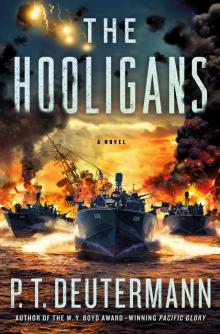 The Hooligans
The Hooligans SPIDER MOUNTAIN
SPIDER MOUNTAIN![Cold Frame [retail] Read online](http://i1.bookreadfree.com/i/03/19/cold_frame_retail_preview.jpg) Cold Frame [retail]
Cold Frame [retail] Sweepers
Sweepers Cam - 03 - The Moonpool
Cam - 03 - The Moonpool Trial by Fire
Trial by Fire Cold Frame
Cold Frame Darkside
Darkside Cam - 04 - Nightwalkers
Cam - 04 - Nightwalkers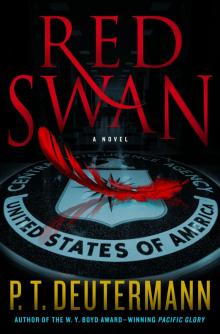 Red Swan
Red Swan The Commodore
The Commodore Hunting Season
Hunting Season The Cat Dancers
The Cat Dancers Scorpion in the Sea
Scorpion in the Sea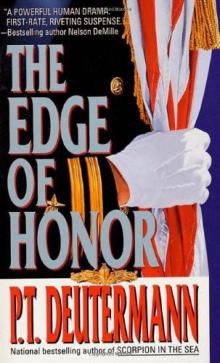 The Edge of Honor
The Edge of Honor The Cat Dancers cr-1
The Cat Dancers cr-1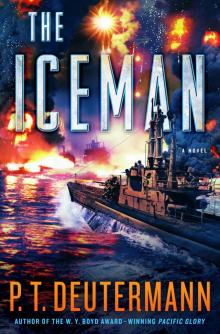 The Iceman
The Iceman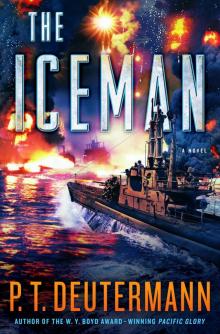 The Iceman_A Novel
The Iceman_A Novel Official Privilege
Official Privilege Sentinels of Fire
Sentinels of Fire The Moonpool cr-3
The Moonpool cr-3 Nightwalkers cr-4
Nightwalkers cr-4 The Firefly
The Firefly Spider mountain cr-2
Spider mountain cr-2 Pacific Glory
Pacific Glory The Last Man
The Last Man